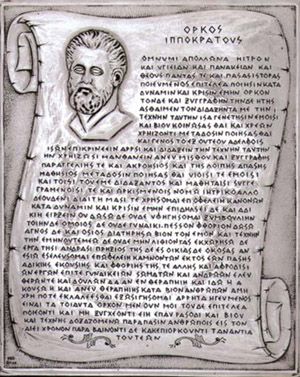
Publisher:
Bonnie King
CONTACT:
Newsroom@Salem-news.com
Advertising:
Adsales@Salem-news.com

~Truth~
~Justice~
~Peace~
TJP
Feb-11-2014 18:57

 TweetFollow @OregonNews
TweetFollow @OregonNews
Is the Hippocratic Oath Being Killed Off by the Big Business of Medicine?
Gary G. Kohls, MD for Salem-News.comWe can do better for our patients – and our dying planet - if we just go back to the honorable past traditions exemplified in the Hippocratic Oath and the Precautionary Principle.
 thehealthculture.com |
(DULUTH, MN) - When people ask me about what motivates me to occasionally blow the whistle on certain ethical issues, I sometimes say that I am just being true to the Hippocratic Oath that I took when I graduated from medical school. My 40 year medical career began as a board certified rural family physician and ended by practicing holistic mental health care for a decade. During that time I have often found myself, usually unconsciously, invoking the “primum non nocere” (latin for “first do no harm” ) standard while recommending a treatment for a patient. The Oath has served me well in medicine as well as in life, child-rearing, marriage and politics.
Following the ethical standards outlined in the Hippocratic Oath probably makes practicing modern medicine more challenging. In an era where deadly medicines (that are packaged in sub-lethal dosages) are being manufactured and marketed at an increasingly rapid pace by very powerful multinational pharmaceutical corporations that have seemingly unlimited resources to brain-wash us prescribers and our patients about their synthetic chemicals and the secrets of their laboratories, it is getting harder and harder to avoid doing harm to our patients.
The Big Business of Medicine seems to have decided that patients should be denied the time to relate all the pertinent details of their illnesses or to be able to ask all the pertinent questions they need to ask.
 |
The Big Business of Medicine seems to have decreed that physicians should be denied the time to take comprehensive histories, thus impairing our ability make accurate diagnoses and plan curative therapies. Whoever is in charge of medical care delivery these days seems to have decided that physicians and nurses should be denied the time to do the thorough teaching required to be maximally effective discharging their duties, with the possibility, indeed the inevitability, of engaging in misdiagnoses and medical misadventures.
Just consider this simple fact: Trans-national drug companies that manufacture pharmaceutical drugs do not study the effects of drug combinations (of two or more drugs at a time) in the brains or organs of experimental animals – and the testing that is done on that single drug is usually only for an extremely brief period of time, often just hours, days or weeks. This is especially true for brain research.
That means that the physicians of the vast majority of drug-taking patients (especially the elderly who, studies say, swallow half a dozen or more pills per day) have no good scientific data that proves the safety or even mechanism of action of their regimen. That makes the swallowing of more than one such drug at a time a scientific crap shoot and an ethical dilemma for the doctor who has pledged to do no harm. Since there are no biopsy, radiology or immunoassay studies that tell neuroscientists and physicians whether or not any of the millions of possible drug combinations (or the billions or trillions of possible drug dosage combinations) are safe or even effective, the prescribing physician may be inadvertently doing harm to his or her unsuspecting patient when those untested combinations are prescribed.
 |
And that goes for human clinical studies as well, where, in the case of psychotropic drug testing, patients-subjects of psychiatrists are tested with a single experimental drug for a relatively short period of time (usually just a couple of months or less), with no biopsy or radiological proof of long-term safety or efficacy before the FDA approves it (for long-term use). So again, patients who are prescribed more than one drug at a time have no scientific assurance of long-term safety or efficacy. Both those pre-marketing short-comings place the prescribing physician, unbeknownst to the patient, in an ethical bind.
And that is where the Hippocratic Oath should come in - if it still has any relevance in this age of modern medicine.
The Oath of Hippocrates is 2,500 years old and came out of ancient Greece. It is increasingly regarded by many, especially Big Business, pro-corporate types, as having limited applications to modern medicine. But if you ask patients who are concerned about the safety and effectiveness of their drugs, they regard the “never do harm to anyone” ethic as still being relevant to them and their children, even if Big Business has decreed otherwise.
Immediately below is an English translation of the Oath. Note that dietary treatment is the first regimen mentioned in the oath, which underlines what Hippocrates is often quoted as having said, namely, that “food is medicine and the best medicine is the best food”. Also note the underlined portions, especially the line that condemns deadly medicines.
The Oath of Hippocrates
 |
I swear by Apollo, the healer, Ascelepius, Hygieia and Panacea, I take to witness all the gods, all the goddesses, to keep according to my ability and my judgment, the following Oath and agreement:
To consider dear to me, as my parents, him who taught me this art; to live in common with him and, if necessary, to share my goods with him; To look upon his children as my own brothers, to teach them this art; and that by my teaching, I will impart a knowledge of this art to my own sons, and to my teacher's sons, and to disciples bound by an indenture and oath according to the medical laws, and no others.
I will prescribe dietetic regimens for the good of my patients according to my ability and my judgment and never do harm to anyone.
I will give no deadly medicine to any one if asked, nor suggest any such counsel; and similarly I will not give a woman a pessary to cause an abortion,
But I will preserve the purity of my life and my arts.
I will not cut for stone (Ed note: “cut for stone” means “to operate on bladder stones”), even for patients in whom the disease is manifest; I will leave this operation to be performed by practitioners, specialists in this area.
In every house where I come I will enter only for the good of my patients, keeping myself far from all intentional ill-doing and all seduction and especially from the pleasures of love with women or men, be they free or slaves.
All that may come to my knowledge in the exercise of my profession or in daily commerce with men, which ought not to be spread abroad, I will keep secret and will never reveal.
If I keep this oath faithfully, may I enjoy my life and practise my art, respected by all humanity and in all times; but if I swerve from it or violate it, may the reverse be my life.
Non-physicians do not pledge the Hippocratic Oath when they complete their studies, although some paramedical educational institutions have adapted portions of it for their purposes. Some nursing schools, for instance, have their graduates take a pledge called the Nightengale Pledge (which was written in the 1890s in honor of Florence Nightengale, the founder of modern nursing. Nightengale gained international fame for her efforts on behalf of wounded, sickened and malnourished soldiers during the disastrous British military misadventure in the Crimea in the 1850s). Here is one version of the Nightengale Pledge:
The Nightengale Pledge
I solemnly pledge myself before God and in the presence of this assembly, to pass my life in purity and to practice my profession faithfully.
I will abstain from whatever is deleterious and mischievous, and will not take or knowingly administer any harmful drug.
I will do all in my power to maintain and elevate the standard of my profession, and will hold in confidence all personal matters committed to my keeping and all family affairs coming to my knowledge in the practice of my calling.
With loyalty will I endeavor to aid the physician, in his work, and devote myself to the welfare of those committed to my care.
Is the Hippocratic Oath Obsolete, Overlooked or Just Killed Off?
Most of us took the Hippocratic Oath seriously in the early stages of our medical careers, but after getting into the “real world” of high-productivity medicine, most of us had no choice but to gradually compromise our ideals because of 1) the need sign on with a well-administered clinic; 2) the need to be maximally productive (seeing as many patients as possible in the shortest period of time) in order to pay off our $100,000+ medical education debt; 3) the need to stop trying to do all the time-consuming things that patients expect and deserve; 4) the need to get most of our continuing medical education credits from courses subsidized by the pharmaceutical industry; 5) being seduced almost daily by the pharmaceutical industry’s very attractive opposite-sex sales reps, bearing gifts of “pens, pizzas and post-it notes” in their drug company’s efforts to get us to uncritically adopt, as the new “community standard of care”, the extensive use of potentially toxic synthetic chemicals not yet proven to be safe long-term, especially when combinations of these always very expensive drugs are used.
It is often said that the real clinical trials of new drugs start when the brief pre-marketing studies - involving only hundreds or occasionally thousands of test subjects - have been approved by the FDA, for that is when millions of unsuspecting, but excited patients get their first prescriptions of the latest wannabe blockbuster drug that they saw presented so appealingly on TV.
Big Business argues that the profitability of business enterprises depends on getting new products into the marketplace quickly in order to generate profits as soon as possible. Thus, paying for thorough, independent long-term studies (especially with watchdog agency oversight) is only grudgingly accepted by the profit-driven investors on Wall Street.
Apply to Patients as Well?
In light of the current corporate reality of profit maximization (and that goes for HMOs, hospitals and most clinics, especially the for-profit kinds with their multimillionaire CEOs), we physicians should be the ones who make sure that no harm is being done because of the drugs we prescribe. Throughout history, physicians have always accepted, as a sacred trust, the duty to warn patients about the potential dangers of their treatments, and there are many. (For more on iatrogenic diseases (doctor or medical treatment-caused), see Dr. Barbara Starfield’s article in the July 26, 2000 issue of the JAMA documenting the annual 225,000 iatrogenic deaths per year in the US; also at http://en.wikipedia.org/wiki/
 |
In order for a patient to give fully informed consent to a treatment option, he or she must be given thorough information about the risks, safety and efficacy of the treatment both short-term and long-term, which, in the case of most psychiatric drugs, is virtually impossible to do given the lack of long-term studies that were done prior to FDA approval and the poor post-marketing surveillance that is done. Medical malpractice suits commonly revolve around the issue of adequate informed consent.
Patients deserve to know whether or not psychotropic drugs are addicting or dependency-inducing, are capable of causing withdrawal symptoms or whether or not the patient can be sickened or intoxicated by the drugs. Patients also deserve to know about the existence alternative therapies which, in the case of mental health issues, utilize good psychotherapy and nutritionally-based, life-style alterations, approaches that are often falsely discredited by medical trade association groups like the AMA, the APA and their medical journals. The giant multinational corporations that generously fund such groups, are always looking for ways to eliminate the competition in order to achieve a near-monopoly for the sale of their substances.
A Word in Favor of Reviving the Precautionary Principle

|
The time-honored Precautionary Principle says that an ethical business, governmental agency or culture should err on the side of caution before new chemicals, technologies, procedures, services, food additives, drugs, surgical procedures, etc are introduced into the marketplace (and the environment) – and only then should they be allowed on the market when there is absolute proof that the substances are not dangerous to the environment (which includes human/animal life, the water supply, the soil and the air – ie., our fragile planet).
So when medical industries wish to market new synthetic chemical substances that have the potential to adversely affect human or environmental health (even years or decades into the future) the Precautionary Principle requires that adequate and aggressive long-term studies (funded by agencies totally independent of those who want to profit from the substance) be undertaken and then only approved when it has been proven to be totally safe.
So, under the Precautionary Principle, regulatory agencies must be given permission to aggressively withhold the marketing approval of potentially carcinogenic, disease-producing, neurotoxic or immune system-destroying products from the environment from where they may be ingested, inhaled or otherwise absorbed into the bodies of potential victims.

|
Therefore, before potentially dangerous substances are allowed onto the grocery store shelves or into our pharmacies, hospitals, clinics and then, inevitably, into our bodies, the Precautionary Principle says that they should be first proven that they will do no harm, short-term or long-term.
As was documented in last week’s Duty to Warn column (read it at http://duluthreader.com/
We can do better for our patients – and our dying planet - if we just go back to the honorable past traditions exemplified in the Hippocratic Oath and the Precautionary Principle.
- Dr Kohls is a retired physician from northern Minnesota. He writes a weekly column for the Duluth, Minnesota area’s alternative newsweekly, the Reader Weekly (http://duluthreader.com/
- Dr Kohls warns against the abrupt discontinuation of any psychiatric drug because of the common, often serious (even life-threatening) withdrawal symptoms that can occur. It is important to obtain close consultation with an aware, informed physician who is familiar with treating drug withdrawal syndromes and who is aware of the dangers of psychiatric drugs and the nutritional needs of the drug-intoxicated and nutritionally-depleted brain.
 |
 |
 |
Articles for February 10, 2014 | Articles for February 11, 2014 | Articles for February 12, 2014



Quick Links
DINING
Willamette UniversityGoudy Commons Cafe
Dine on the Queen
Willamette Queen Sternwheeler
MUST SEE SALEM
Oregon Capitol ToursCapitol History Gateway
Willamette River Ride
Willamette Queen Sternwheeler
Historic Home Tours:
Deepwood Museum
The Bush House
Gaiety Hollow Garden
AUCTIONS - APPRAISALS
Auction Masters & AppraisalsCONSTRUCTION SERVICES
Roofing and ContractingSheridan, Ore.
ONLINE SHOPPING
Special Occasion DressesAdvertise with Salem-News
Contact:AdSales@Salem-News.com

Terms of Service | Privacy Policy
All comments and messages are approved by people and self promotional links or unacceptable comments are denied.
[Return to Top]
©2025 Salem-News.com. All opinions expressed in this article are those of the author and do not necessarily reflect those of Salem-News.com.